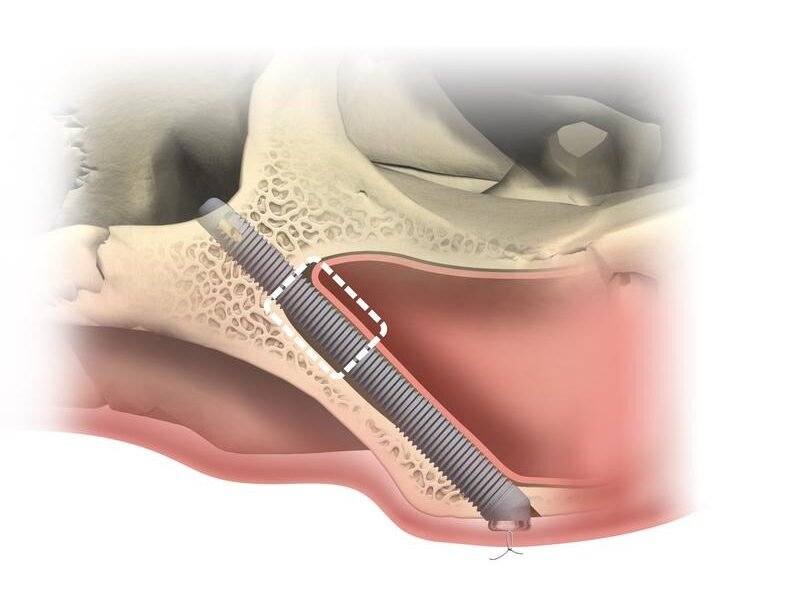Zygomatic Implants: An Innovative Solution for Severe Jaw Bone Loss
At Swiss Implant Klinikum, we specialize in advanced dental implant procedures, including the use of zygomatic implants. These implants are designed for patients with significant upper jaw bone loss, providing a viable alternative when traditional dental implants are not an option. By anchoring the implant in the robust zygomatic bone (cheekbone), zygomatic implants eliminate the need for extensive bone grafting or sinus lift surgeries, offering a solid foundation for dental prostheses.
Candidates for zygomatic implants typically include:
• Patients with Significant Bone Loss: Those who have experienced substantial bone loss in the upper jaw due to periodontal disease, trauma, or long-term denture wear.
• Patients Unsuitable for Standard Implants: Individuals who lack the bone density necessary to support traditional implants.
• Patients with Complex Dental Needs: Those requiring extensive restorative treatment that cannot be supported by the existing jawbone structure.
Is Zygomatic Implant Surgery Right for You?
Determining whether zygomatic implants are the right choice involves a thorough assessment by a dental professional. At Swiss Implant Klinikum, we consider factors such as your general health, the extent of bone loss, and your specific dental goals to develop a personalized treatment plan. Our experienced team, trained in this advanced technique, will ensure the best possible outcomes for your dental restoration.
The Benefits of Zygomatic Implants
Zygomatic implants offer several advantages over traditional dental implants, particularly for patients with challenging dental conditions:
• No Bone Grafting Required: Zygomatic implants eliminate the need for bone grafting or sinus lifts, reducing treatment time and complexity.
• High Success Rates: These implants have demonstrated excellent success rates, even in cases with severe bone deficiencies.
• Immediate Functionality: Patients can often receive a temporary prosthesis on the same day as the implant surgery, maintaining function and aesthetics during the healing process.
• Enhanced Stability: The zygomatic bone provides a strong, stable anchor for the implants, ensuring long-term durability and functionality.
The Zygomatic Implant Procedure
The process of getting zygomatic implants involves several key steps:
1. Consultation and Planning: A thorough evaluation of your dental health, using advanced imaging tools, to assess the structure of your upper jaw and cheekbones. This step is crucial for determining the appropriate implant size and placement.
2. Implant Placement: Under general anesthesia, the implants are surgically anchored into the zygomatic bone at a precise angle, ensuring a secure fit and optimal support for the dental prosthesis.
3. Immediate Loading: In many cases, a temporary prosthesis is placed on the same day as the implant surgery, allowing you to maintain your normal activities while the implants heal and integrate with the bone.
4. Final Restoration: After a healing period of approximately three months, during which the implants fully integrate with the zygomatic bone, a permanent prosthesis is placed, completing the restoration process.
Zygomatic Implants vs. Traditional Implants
When comparing zygomatic implants to traditional dental implants, several key differences stand out:
• Bone Requirements: Traditional implants require sufficient jawbone density and often necessitate bone grafting. In contrast, zygomatic implants are anchored in the cheekbone, bypassing the need for jawbone support.
• Surgical Complexity: Zygomatic implant surgery is more complex and requires a highly skilled surgeon, but it is often the only viable option for patients with significant bone loss.
• Recovery and Outcomes: Both zygomatic and traditional implants aim for stable, long-term results. However, zygomatic implants can shorten the overall treatment time by eliminating the need for bone grafting.
The Success and Longevity of Zygomatic Implants
Zygomatic implants have shown high success rates and are known for their long-term durability. When performed by a qualified practitioner, these implants can last many years, offering a permanent solution for severe upper jaw bone loss. Patients often report significant improvements in their ability to eat, speak, and smile confidently, contributing to an overall better quality of life.
Conclusion
Zygomatic implants offer a groundbreaking solution for patients who struggle with traditional dental implants due to severe bone loss. By utilizing the thick bone of the cheekbone, these implants provide a stable and reliable foundation, enabling patients to achieve both functional and aesthetic restoration without the need for extensive bone grafting procedures. At Swiss Implant Klinikum, we are committed to providing our patients with the highest level of care and expertise in zygomatic implant treatment. If you’ve been told that you are not a candidate for traditional implants, it may be time to explore the benefits of zygomatic implants with us.


